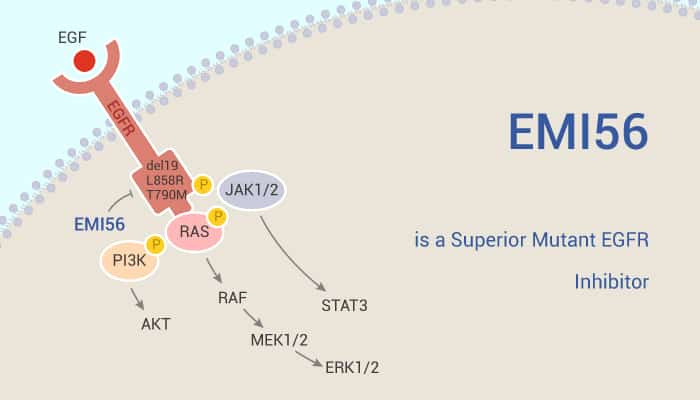Receptor Tyrosine Kinases (RTKs) play critical roles in embryogenesis, normal physiology, and several diseases. Epidermal growth factor receptor (EGFR) is a transmembrane protein with cytoplasmic kinase activity that transduces important growth factor signaling from the extracellular milieu to the cell. Furthermore, EGFR common double mutations include 19Del, L858R, and T790M. The growth rate is lower in cell lines with double mutations of 19Del and T790M than in cell lines with 19Del mutation alone. The mutation in exon 20 (T790M) associates with the resistance to EGFR kinase inhibitors. Both EGFR mutation and gene amplification status may be important in determining which tumors will respond to tyrosine kinase inhibitors.

EMI1 is an EGFR MaMTH Inhibitor. EMI1 acts as an EGFR ex19del/T790M/C797S and EGFR L858R/T790M/C797S activating mutant inhibitor. EMI56, the derivative of EMI1, displays greater potency toward mutant EGFR than EMI1. EMI56 displays an enhanced effect, but at the 10 µM level. Unlike EMI1, EMI56 does not affect interphase microtubules or has an effect on spindle formation in PC9 EGFR ex19del/T790M/C797S cells. The microtubule and EGFR-targeting activity of EMI1 are distinct. EMI56 warrants further investigation to better understand the mechanism involved in their activity and increases potency.
EMI56 displays greater potency toward mutant EGFR signaling than EMI1. In addition, EMI56 also shows a reduced microtubule-depolymerization activity. EMI56 inhibits EGFR ex19del/T790M/C797S and EGFR L858R/T790M/C797S. EMI56 can be used in the research of mutant EGFR-associated, drug-resistant non-small-cell lung cancer (NSCLC).
In summary, EMI56 is a selective mutant but not wild-type EGFR inhibitor for ex19del/T790M/C797S and L858R/T790M/C797S.